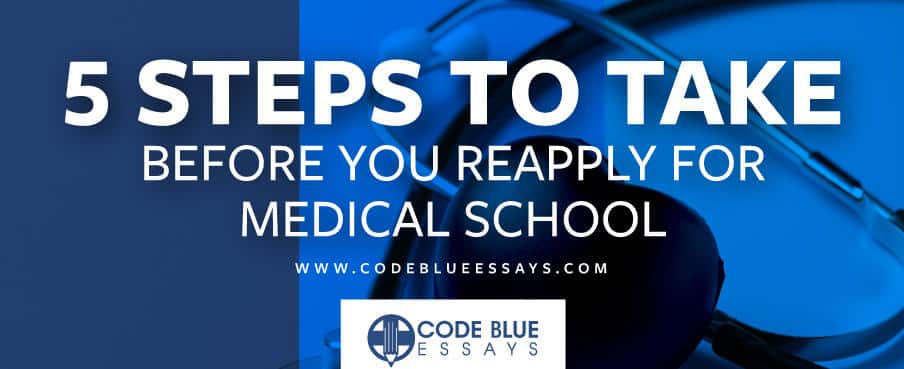Applying to medical school can be a challenging journey, and rejection is a difficult experience many aspiring doctors face. According to the Association of American Medical Colleges, less than half of applicants to U.S. medical schools secure an acceptance letter. Among the remaining 50–60%, some do not even receive an interview invitation. If you find yourself in this group, knowing the right things to do after rejection can make a significant difference in improving your application for the next cycle. Here are five essential Things to Do After Rejection From Medical School that will help you strengthen your profile and increase your chances of success.
5 Steps to Take After Rejection From Medical School to Improve Your Chances
1. Review Your Application Thoroughly
A comprehensive review of your application is the first step to identifying areas of improvement. Examine each component critically, from your academic records and MCAT scores to your personal statement and extracurricular activities.
- Academic Performance: Assess whether your grades in prerequisite courses are competitive and if your MCAT score meets or exceeds the average for your target schools.
- Research and Experience: Consider if your research background, clinical exposure, and volunteer work align with what medical schools value in applicants.
- Personal Statement: Ensure your personal statement clearly conveys your motivation to pursue medicine and avoids over-sharing personal details that might raise concerns. Have a mentor, advisor, or professional editor provide feedback on your application.
Many applicants benefit from services like application reviews and essay editing to refine their materials. Identifying weaknesses early can help you focus on what to improve for your next application cycle.
2. Explore Additional Medical Schools
Sometimes, broadening your options can open new opportunities. If the application cycle is still active, consider applying to schools with rolling admissions or later deadlines. Some Caribbean medical schools, for instance, have flexible deadlines and might be worth exploring. If you have strong ties to certain regions, applying to in-state schools could also enhance your chances, as many prioritize local applicants.
3. Consider Pursuing a Master’s Degree
For those with less competitive GPAs or limited academic achievements, enrolling in a master’s program can help strengthen your credentials. Graduate programs in biomedical sciences, public health, or related fields can:
- Enhance your academic foundation.
- Provide additional research opportunities.
- Facilitate connections with professionals and faculty members who can write strong recommendation letters.
Performing well in a graduate program can also prepare you to retake the MCAT if needed. This year-long investment can significantly improve your profile for medical school applications.
4. Gain Relevant Work Experience
A gap year is an excellent opportunity to build experience and enhance your resume. Consider positions like medical assistant, EMT, or medical scribe. These roles allow you to:
- Work directly with healthcare professionals.
- Gain hands-on patient care experience.
- Develop familiarity with medical terminology and clinical workflows.
Positions like these demonstrate your commitment to the medical field and provide valuable stories to share in future applications or interviews. You can also explore other healthcare-related jobs that align with your career goals.
5. Evaluate Alternative Career Paths
Rejection from medical school can also be an opportunity to reassess your career direction. If you’re open to exploring related professions, consider options like nursing, physician assistant (PA) programs, or other healthcare roles. For example:
- Nursing: A career as a registered nurse offers a hands-on approach to patient care and can be equally fulfilling.
- Physician Assistant: PA programs typically take three years and include extensive clinical training, allowing graduates to diagnose conditions, develop treatment plans, and work in various specialties.
These paths still allow you to contribute significantly to healthcare while offering different routes to professional success.
Overcoming the Challenges of Reapplication
The time between rejection and reapplication can feel uncertain, but it’s also an opportunity for growth. Reflect on the lessons learned from your previous application cycle, and use this period to build a stronger profile. Remember that the path to medical school is rarely straightforward, and perseverance is often key to achieving your goals.
Our Services to Support Your Journey
For applicants looking for personalized guidance, professional services can help evaluate previous applications and offer tailored advice. Common areas of focus include:
- Identifying weaknesses in your application.
- Editing your personal statement and secondary essays.
- Providing actionable strategies to enhance your profile.
By addressing specific concerns, you can approach your next application cycle with greater confidence.
FAQs
1. What are the most common reasons medical school applications are rejected?
The most common reasons include low academic performance, insufficient clinical experience, weak personal statements, and a lack of alignment with the mission and values of the schools applied to.
2. Should I reapply immediately or wait a year?
It depends on the weaknesses in your application. If substantial improvements, such as higher test scores or additional experience, can be made within a year, reapplying immediately might be viable. Otherwise, taking more time to strengthen your profile is often beneficial.
3. Can I improve my chances without pursuing a master’s degree?
Yes, gaining relevant work experience, retaking the MCAT (if needed), and addressing gaps in your extracurricular profile can also improve your chances significantly.
4. Are Caribbean medical schools a good option?
Caribbean medical schools can be an alternative for some students, but it’s important to research their accreditation, residency placement rates, and overall reputation before applying.

